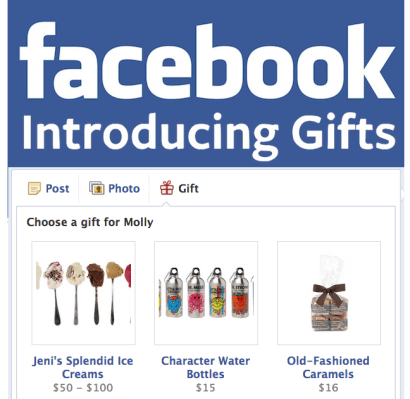Facebook today launches Facebook Gifts to make ecommerce more convenient. It turns user data into suggestions for gifts to buy right from where you spend your time — and without a friend’s address. Facebook earns a percentage of sales when you use it to buy friends physical products or digital gift cards for their birthdays, weddings, or other special occasions.
Starbucks, Uber cabs, Warby Parker glasses and products from over 100 other partners can be purchased over desktop or mobile for friends who’ll receive them as digital gift cards or physical shipments. You can even buy Gifts for yourself.
Facebook Gifts, the rebirth of gift app Karma, which Facebook acquired in May, is rolling out to select U.S. users today. The rest of the country will get it soon, and Facebook is mulling over an international launch of Gifts that could pull buyers away from Amazon, eBay, Etsy, and other shopping sites.
Heads Up, Ecommerce Industry
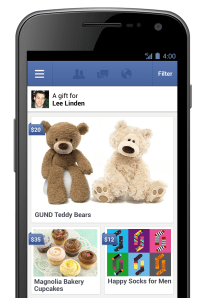 Getting the live demo from Karma co-founder and head of Gifts Lee Linden, I was very impressed. He didn’t deny my assertion that Facebook Gifts has the potential to compete with big ecommerce sites and smaller apps like Wrapp or Gyft. He declared “our goal is to make this the best way to send a gift.” And to be clear, these are real-world gifts like chocolate, teddy bears, or a free latte, not virtual goods like little images of birthday cakes that Facebook once sold under the name “Gift Shop” but discontinued in 2008.
Getting the live demo from Karma co-founder and head of Gifts Lee Linden, I was very impressed. He didn’t deny my assertion that Facebook Gifts has the potential to compete with big ecommerce sites and smaller apps like Wrapp or Gyft. He declared “our goal is to make this the best way to send a gift.” And to be clear, these are real-world gifts like chocolate, teddy bears, or a free latte, not virtual goods like little images of birthday cakes that Facebook once sold under the name “Gift Shop” but discontinued in 2008.
The new Facebook Gifts product takes advantage of Facebook’s expansive social graph to solve a major problem with gift giving: not knowing the shipping address of the recipient. By popping the recipient with a notification asking them to choose an existing stored address or add a new one right when the gift is bought, there’s no guess work on the part of the sender.
It seems like an incredible last-minute gifting tool. Facebook Gifts recipients know someone cares the moment the gift is selected. That’s much better than most ecommerce platforms that just ship the recipient a product that could take days or weeks to arrive. The way Gifts assesses the profile of the recipient and recommends relevant gifts could be a huge help to people who like giving but hate shopping.
While Facebook wouldn’t reveal what percentage it’s taking in the revenue split, though it said it varies by product and partner, Facebook Gifts could let the social network rapidly ramp up the average revenue per user it earns. After all, some estimates peg the U.S. online gift market at roughly $38 billion a year.
Facebook made about $9.51 per user in the U.S. in 2011. If it earned 10 percent on two $15 gifts per year, it’d instantly be making 30 percent more per user. If the margin is higher or Facebook can convince users to buy bigger gifts more frequently, it could score a year’s worth of ad revenue in a few clicks. And this money can be made on mobile, with users paying with previously stored or a new credit card. Because margins on physical goods are smaller than virtual goods, Facebook doesn’t offer PayPal as a payment option the way it’s willing to pay fees to use the payment processor for in-game purchases.
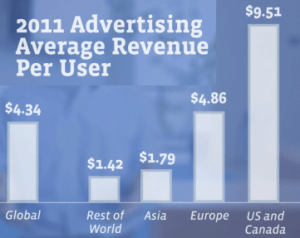 In exchange for the revenue share that varies by product and partner, Facebook offers discovery of things to buy where people spend their time. Facebook also photographs the products, writes custom copy, sends the digital orders to partners, equips them with Facebook packaging but tries to seamlessly integrate into their shipping process, and then tracks shipping and keeps buyers and recipients in the loop.
In exchange for the revenue share that varies by product and partner, Facebook offers discovery of things to buy where people spend their time. Facebook also photographs the products, writes custom copy, sends the digital orders to partners, equips them with Facebook packaging but tries to seamlessly integrate into their shipping process, and then tracks shipping and keeps buyers and recipients in the loop.
Plus, by making the gift-receiving process social, each purchase becomes a highly visible endorsement of a product. This leads to higher awareness and preference for its partners like 1-800-Flowers, Magnolia Bakery, Happy Socks, and Jessica Alba’s Honest Company. In the end, that could convince them and others that working with Facebook Gifts is a gateway to both direct and indirect revenue, and give Facebook a bigger cut.
And if the revenue weren’t enough, Facebook Gifts will surely collect huge sets of home addresses and credit card numbers that could help it down the line.
In the end, if I had to choose where to buy a gift for a friend online, I might very well choose Facebook, because it takes care of so much of the process, from gift selection to delivery, and makes me seem thoughtful even if I don’t think of someone until the last minute.
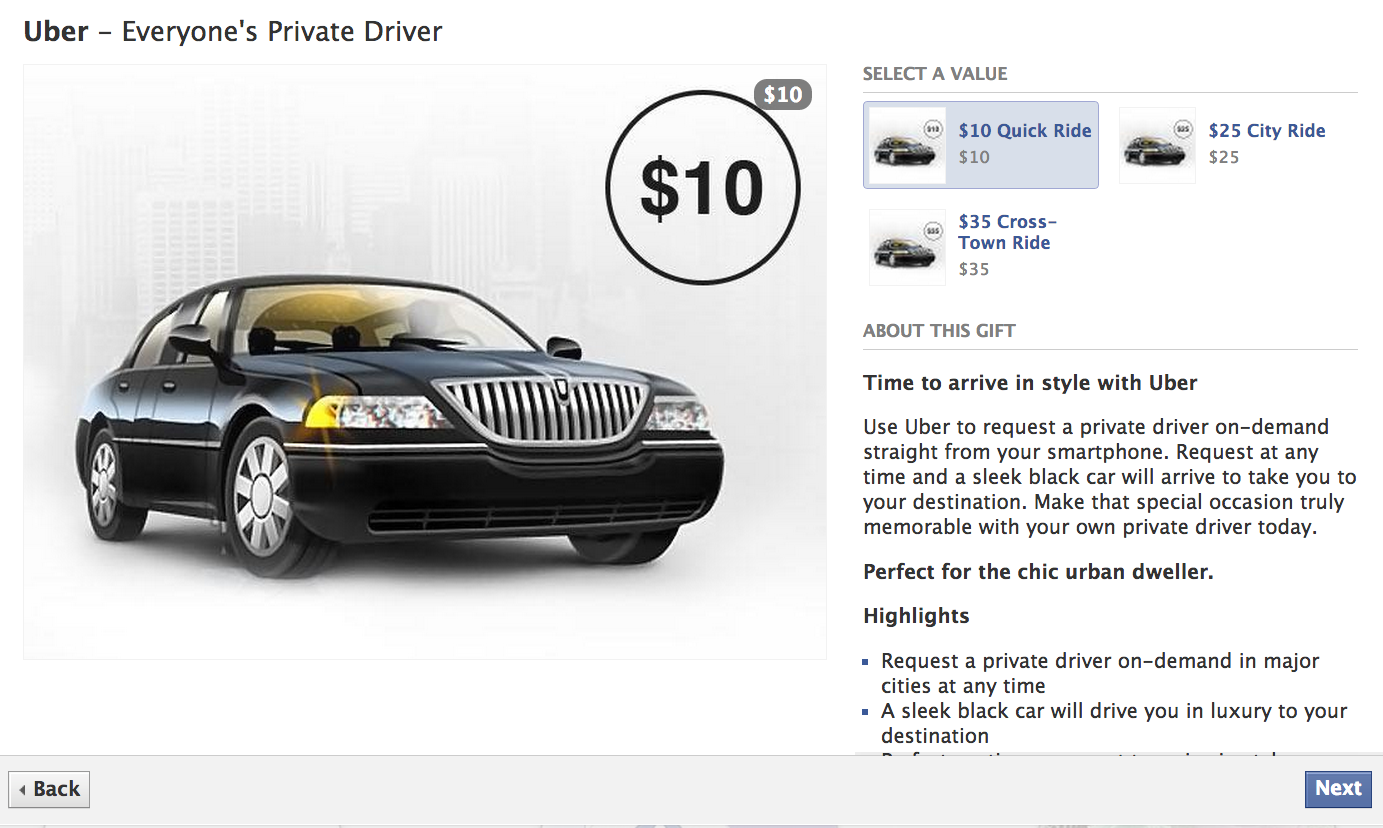
How Facebook Gifts Works
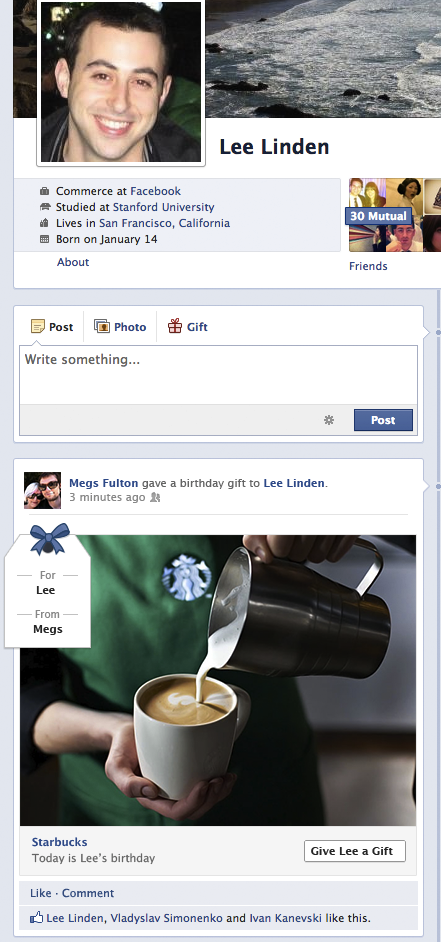
- You see recommendations on the “Birthdays and Life Events” section of your home page of friends celebrating special occasions, or in the Gifts tab of the wall post composer on the Timelines of friends on desktop and mobile.
- Select one and choose a product to buy for them. You can choose the style/size/flavor or leave it up to them.
- Write a personal message and choose to share the gift privately or on the friend’s wall.
- You can choose to pay immediately, or later before the gift is shipped.
- The recipient gets notified of their gift on Facebook desktop on mobile.
- They and their friends can see the wrapped gift on the wall or news feed.
- The recipient unwraps the gift, sees what they’ve been sent, and can select styles or other options and enter their shipping address. If they don’t like their gift they can secretly swap it for a similarly priced one.
- Friends see news feed and Timeline stories about the gift and can Like or comment.
- The sender gets notified as the gift is unwrapped, the card is read, and the gift is shipped.
- If it’s a digital gift like a $5 Starbucks credit or free Uber ride, they instantly get it on their phone and can redeem it in the store or the company’s app.
- If it’s a physical product, it’s packed in a Facebook bag and sent by its manufacturer to the recipient.

Gifts has the potential to relieve the strain on Facebook’s ads business to bring home all the bread necessary to satisfy its investors. As mobile payments for games decline, Facebook’s user base shifts to mobile where it doesn’t earn much on virtual goods, this real good business could pick up the slack.
And importantly, it’s not just ‘compatible’ with mobile. Linden called it a “mobile-first” product, which makes sense since it evolved out of the Karma app. Gifts isn’t too intrusive the way cramming the Facebook apps full of more ads might be. Instead, Linden says, “We truly think it’s a natural extension of what people do on Facebook. Facebook is where we share and talk about life moments — a new baby, engagement, or just saying ‘I’m thinking of you’. We’re taking these real moments and combining them with real gifts.”
A subset of Facebook’s desktop and Android users in the U.S. can now start buying and receiving gifts. iOS users can receive gifts, and purchasing will come with an update to Facebook for iOS in a few weeks. Anyone who receives a gift is instantly admitted to the Gifts user base and can then send them. There’s currently no concrete plans or date for an international launch.
